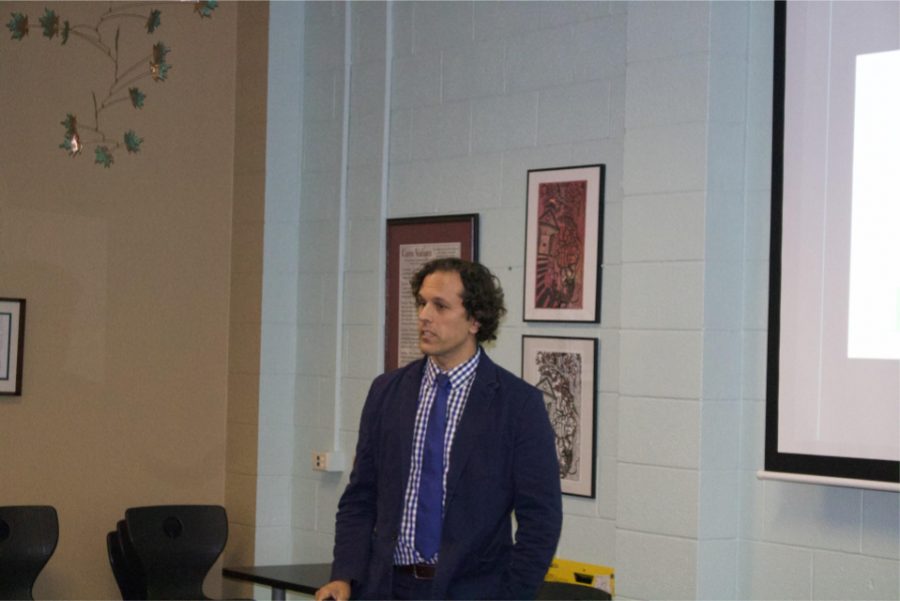Guilford presents faculty research
Welcomed by delicious refreshments, on Thursday, Nov. 7, Guilford College faculty and students enjoyed presentations by Associate Professor of Spanish Alfonso Abad Mancheño and Associate Professor of Philosophy Vance Ricks.
Mancheño presented his research on the role of effective motivation in second language learning. This was followed by Ricks, who broke down the ethics of the afterlife in “The Good Place.”
The event began with Mancheño sharing his findings on the role of effective motivation in second language learning in a sample of Guilford College students. During the first part of Mancheño’s presentation, he referred to his master’s thesis which he completed last year on motivation in second language learning. Mancheño decided to make some corrections and additions to his thesis research as he was able to obtain more data.
As Mancheño began to share his new findings, he described the relationship between motivation and second language learning by basing his work on the theories by Darnier, a Honduran linguist who works mainly in motivation.
Mancheño followed the model by the Honduran linguist that explains the concept of projected effort, ideal L2 self and ought-to L2 self and its relationship with academic performance in the second language (L2) learning.
“The L2 self is what we are expected to be by society, family and college. It is an occupation that people want us to have,” Mancheño elaborated.
He continued to explain the concept of projected effort and its relationship to academic performance. Mancheño found that second language learning experience varies between those who have more integrative learning and those who use the language as a tool.
“Learners have two orientations. They either have more integrative orientation, where they want to become part of the community of the second language, or they have more of an instrumental orientation where they see language learning as a tool,” said Mancheño.
Language learning deals with psychological aspects such as self-determination, self-confidence and the ideal self. Mancheño continued to explain how all those theories by Darnier play a big role in the success of the second language learning process.
Halfway through the event, Ricks began talking about ethics and the afterlife in “The Good Place.” This analysis of “The Good Place” is a project that Ricks worked on during his study leave last year.
This is connected to a new project on an edited series on coediting, which he worked on alongside a colleague who teaches at Meredith College. The project is focused on a television series that explores ethical themes and is used as a tool to teach ethical values.
Ricks showed his sense of humor by giving acknowledgment to the research committee for allowing him to complete his research during study leave. He also warned that he would be spoiling some of the content from the show “The Good Place.” Then he began by analyzing some of the plot in the show.
Ricks went on to talk about the distinctive aspect that sets it aside from other series, such as The Cosby Show and I Love Lucy, when it comes to ethics.
“What I think is distinctive about it is the approach to ethics,” said Ricks. “In particular, I don’t think the series is about ethics but more so about metaethics.”
Ricks explained that metaethics is a concept in analytic philosophy that explores the foundation of moral values.
Later he showed a clip from the first episode of the series to illustrate his point about metaethics. In episode one, protagonist Eleanor Shellstrop is told that she in the Good Place but is actually in what is referred to as the Bad Place. Ricks explains that in the series, the Bad Place does not characterize the people as bad, but they are bad in the sense that all ordinary people are bad.
Late during his presentation, Ricks introduced the concept of normative ethics. He provided some examples of normative theories, such as golden oldies, utilitarianism and virtue ethics.
“Normative ethics is focused on the theories or the framework that we use to help us figure out what the correct moral ideals are and the principles or the perspectives that we should be using,” said Ricks.
Bonner Center Student Employment Coordinator Susan May gives her perspective of the presentations.
“I have observed much of what Alfonso was describing,” said May. “Motivation seems to be affected by the home life situation, immediate need, the ideal self and future goals. I believe that it is possible for teachers to consciously encourage effective vision in new language learners to generate successful outcomes.”
May also seemed to agree with Mancheño’s strategies for second language learning.
“Alfonso’s presentation highlighted many of these strategies,” said May. “I feel confident that this information is relevant and may be quite helpful to add to our service training for Guilford student tutors and mentors who work with refugee, immigrant and other community members. Also for those that are learning English as a second or third language, it will encourage a deeper understanding and create a more effective learning environment and access to language resources.”
Editor’s note: This story originally was published in Volume 106, Issue 6 of The Guilfordian on Nov. 15 2019.








